Kimbho, the messaging app launched with much fanfare by Baba Ramdev’s Patanjali became the subject of controversy barely a few hours after its launch. In a report dated May 31, Alt News had exposed how the app, marketed aggressively as the first messaging app developed in India was actually a rebranded version of an app called Bolo messenger developed by a company registered in Fremont, California. Kimbho invited further controversy when a French security researcher Elliot Alderson (@fs0c131y) tweeted that the app has serious security loopholes. The app was later withdrawn and lasted on the Google play store for less than 24 hours.
Hi @KimbhoApp before trying to compete #WhatsApp, you can try to secure your app. It’s possible to choose a security code between 0001 and 9999 and send it to the number of your choice #kimbhoApp pic.twitter.com/YQqK8lfIeI
— Elliot Alderson (@fs0c131y) May 30, 2018
Patanjali has been one of the biggest advertisers for mainstream media since its launch in 2006. It would thus be interesting to find out whether these mainstream news outlets reported about these controversies and if they did, how exactly did they report the news. The Alt News expose was published at 2:45 pm on May 31. We looked at both print and television news outlets that broadcast/print in English or Hindi.
We found that media reports on the story fell into three categories-
I. Those which reported only about the disappearance of the app
II. Those which reported the security concerns surrounding the app and
III. Those who also referred to the origin of the app as well as the security concerns
I. Reported only on disappearance of app from store
English media
Asian News International (ANI)
News agency ANI published an article on the evening of May 31. There was however not a single mention of the fact that the app has been exposed for pretending to be a ‘swadeshi’ app when in fact it is not. Neither was there any reference to the serious security concerns that have been raised. Instead, the article strongly came across as an endorsement of the app, the headline of which read “Patanjali’s new app ‘Kimbho’ receives great response”. The article now stands deleted but Alt News has archived it, and can be accessed here. Another article published by ANI which reported how the app is set to take on WhatsApp too stands deleted.

Times Now
Times Now, one of the most popular English news channels published an article on the evening of May 31, hours after the Alt News expose. The write-up essentially read like a promotional article for Kimbho app, listing out its various features and lauding the creator of the app. There was not even a cursory mention of the security concerns raised over the app, nor any reference to the controversy over its origin. Not just that, there were in all 4 articles on Kimbho which were promotional in nature. An excerpt from the article linked above reads, “Patanjali’s Kimbho app was pulled down from the Google Play Store but Patanjali will be bringing back the chatting platform soon. The company confirmed in a tweet that they received extremely high traffic on the Kimbho app.”
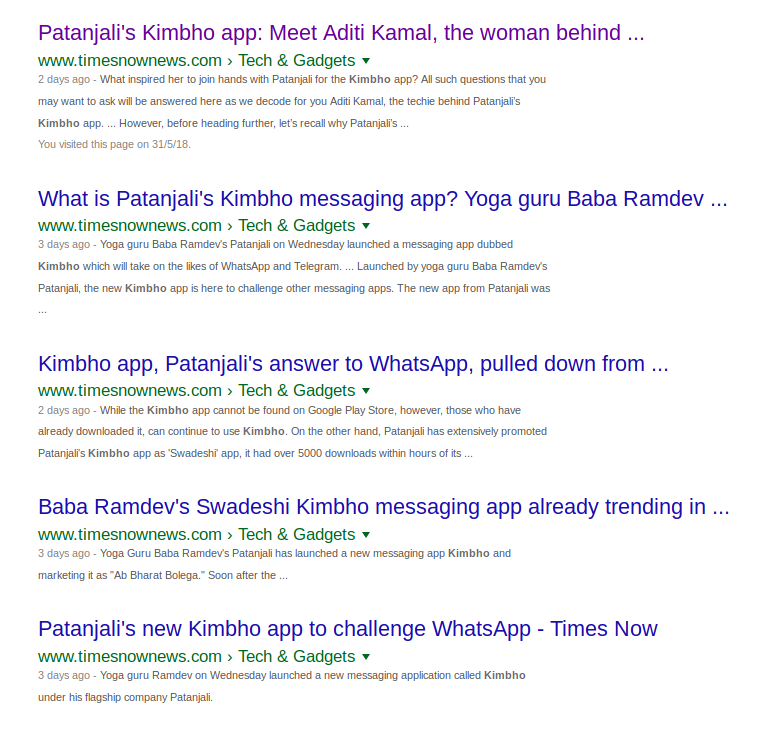
Hindi media
Zee News
The report by Zee News on the disappearance of the app was an eyewash. A one minute video was broadcast by the channel in which screenshots of the app were interspersed with text stating that the app cannot be found on the Google play store. The report also mentioned how the app was downloaded over 50,000 times in less than a day. There was no reference to the controversies surrounding the app.
Dainik Jagran
The popular Hindi daily Dainik Jagran‘s report on the app vanishing from the store did not have a single reference to the controversies over the app, and instead read like a promotional campaign for Kimbho.
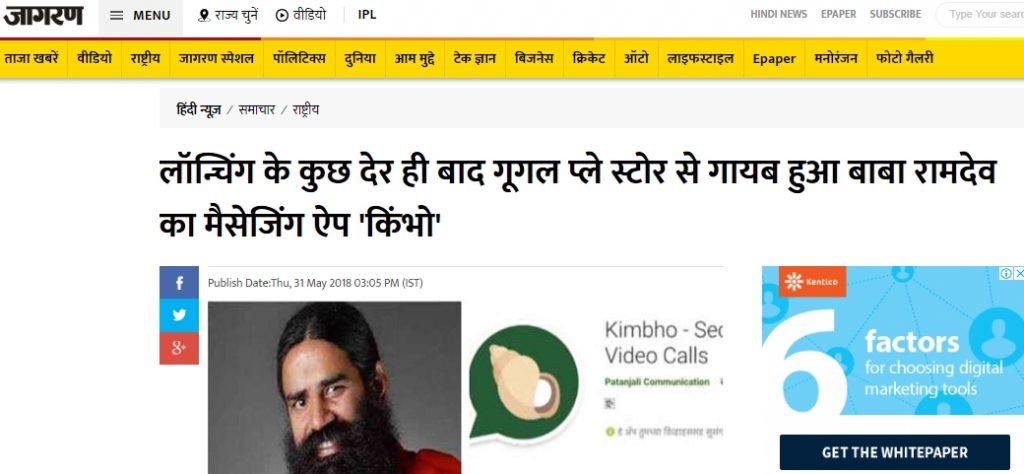
Hindustan
Hindustan, another popular Hindi publication published a report on the evening of May 31 over the app’s disappearance. By way of explanation, the article carried the clarification by Patanjali, and ignored the controversies.
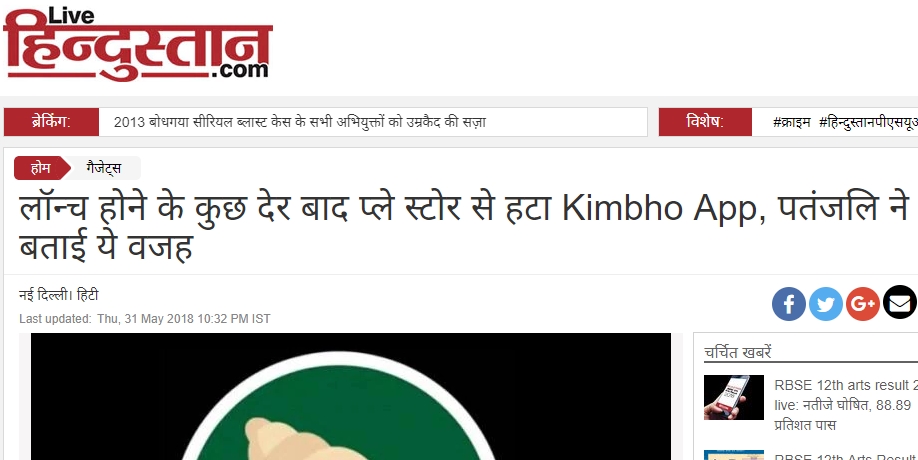
II. Reported only on security issues of Kimbho
English media
Economic Times
Economic Times which belongs to the Bennett Coleman group that owns Times of India, published a short article on the morning of June 1 reporting that the app has been withdrawn after a test run owing to security concerns. The report carried the statement of Patanjali but did not mention about the controversy over the ‘swadeshi’ claim. Another report on the security issues with the app was titled “French hacker claims Baba Ramdev’s newmessaging app Kimbho ‘a security disaster”.
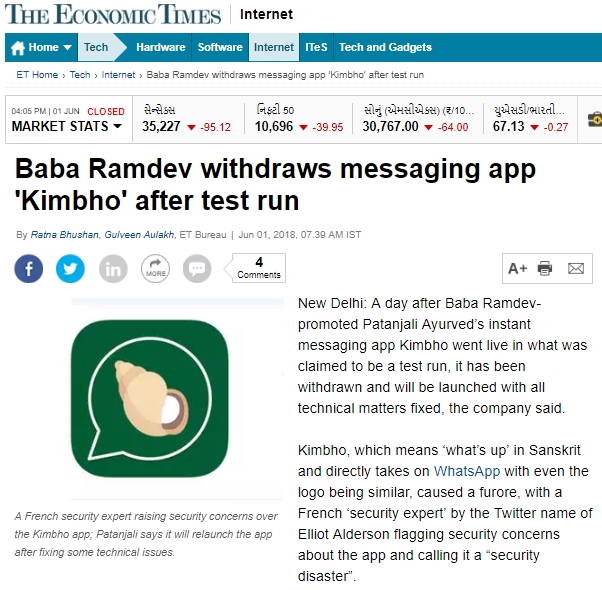
Mirror Now
Mirror Now which is owned by the Bennett Coleman group broadcast a report on the withdrawal of the app. The text of the report stated, ‘Swadeshi WhatsApp pulled out’, reiterating the false claim made by Patanjali that Kimbho is an Indian messaging app. Like all other news outlets, Mirror Now too stressed on the security aspect of the application and chose to ignore the controversy over its origin.
Business Standard
The popular business newspaper, Business Standard interestingly republished the ANI article promoting the Kimbho app which ANI later deleted.
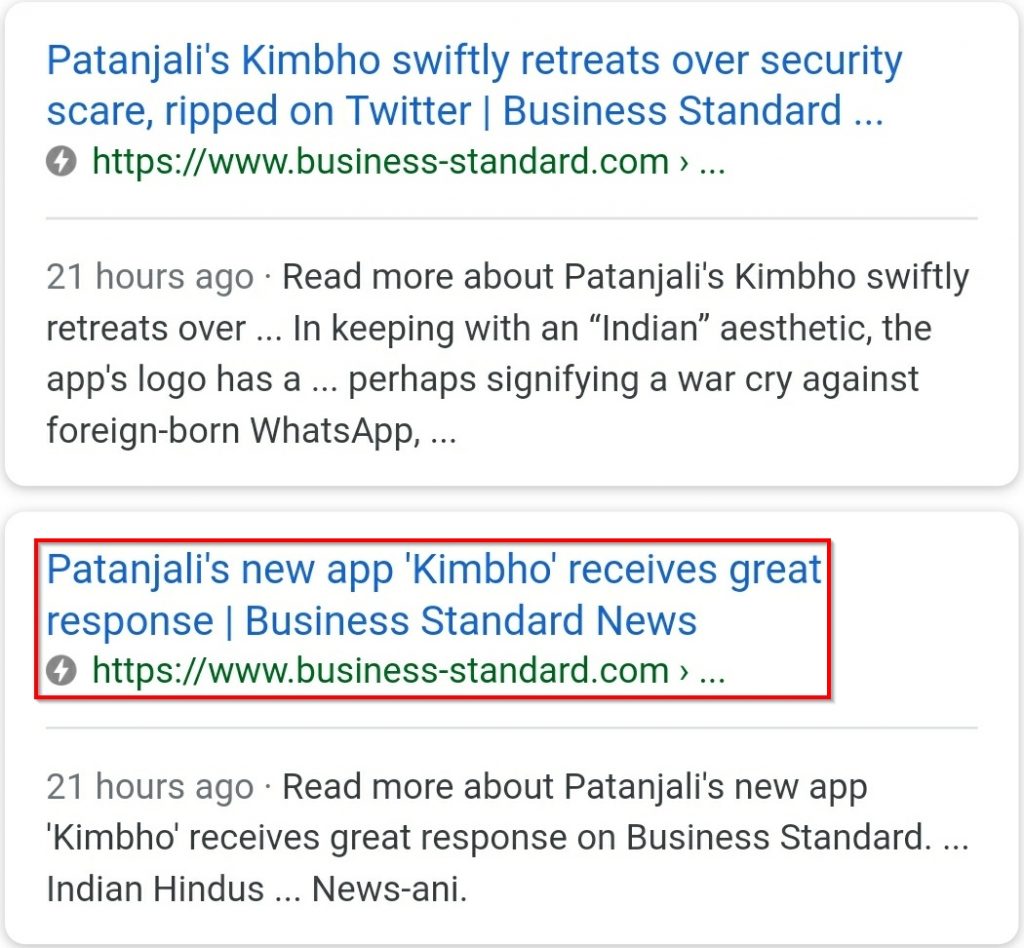
In another article, the newspaper reported that the app was withdrawn over a security scare, and that it had been flayed by social media users on Twitter.
Hindi media
Amar Ujala
Amar Ujala‘s report on the development over Kimbho had a one line explanation for the app’s disappearance, referring to the security concern raised by French researcher Elliot Alderson. The article also referred to the controversy over the appearance of the photograph of a Pakistani actress within the application.
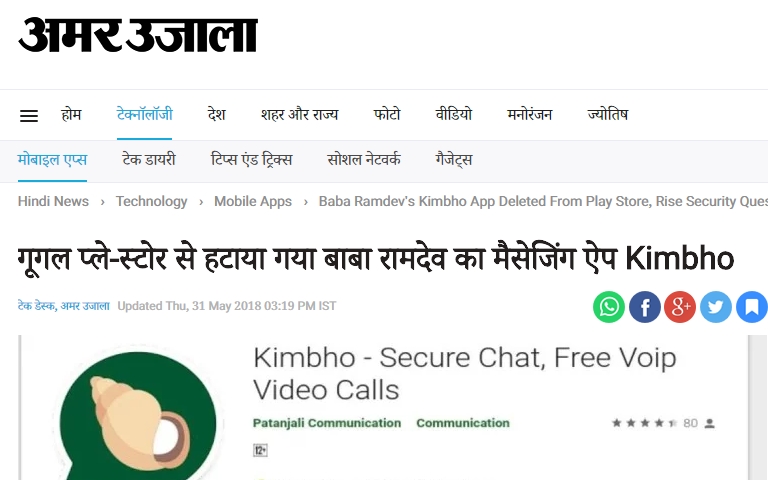
ABP News
ABP News, another popular Hindi news channel had reported the launch of Kimbho app by Patanjali on May 30, but Alt News could not find a report on the channel about the vanishing act. On the website however, the news organisation carried an article reporting about the security fears surrounding the app. Once again, there was no mention of the false claim by Patanjali that Kimbho is India’s first messaging app.
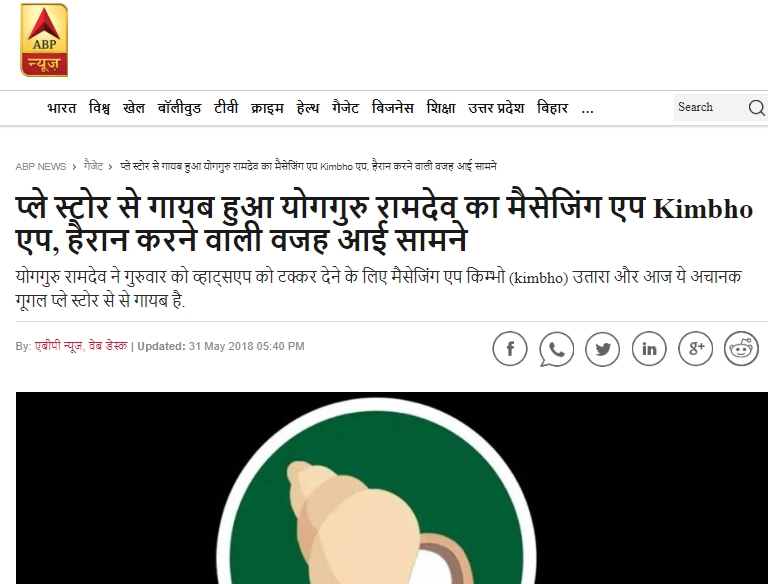
III. Reported about the origin of the app and similarity to ‘Bolo’ app
English Media
Times of India
Times of India reported in its print edition that the app has been “taken off the Google Play Store within a day of its debut, amid allegations of security weaknesses by some of those who had downloaded it.” This news found space only on page 13 of the newspaper, in a tiny column.
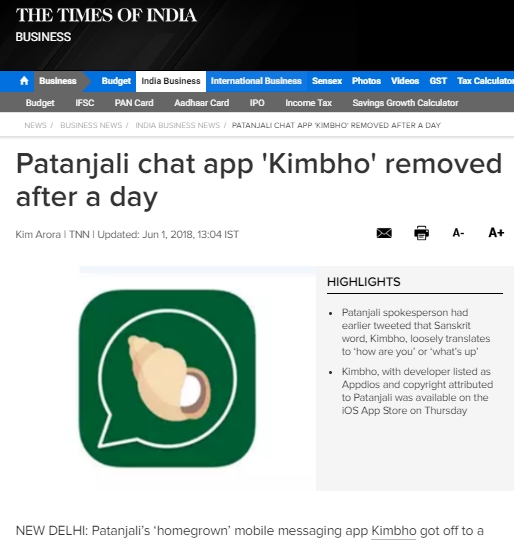
The newspaper published another article in its online edition in which it stated, “However, the link with Appdios remains unclear. Those who managed to download the app before it disappeared shared screenshots that showed OTP verification messages that they received from “IX-BOLOAP.” TOI could not find the Bolo app on any app store at the time of writing. But it was written about on app review and recommendation websites. The developer here too was Appdios, with an app description that matched Kimbho’s verbatim. Appdios’ online trail suggests it is a company based in the US, with one Aditi Kamal as founder.”
Indian Express
Indian Express published a report on the security loopholes of Kimbho app with the headline, “Kimbho app from Baba Ramdev a ‘security disaster’, claims French Researcher”. The article also mentioned about the app’s similarities to ‘Bolo’ app. Another article stated that the app was taken down as it was a trial version according to Patanjali.
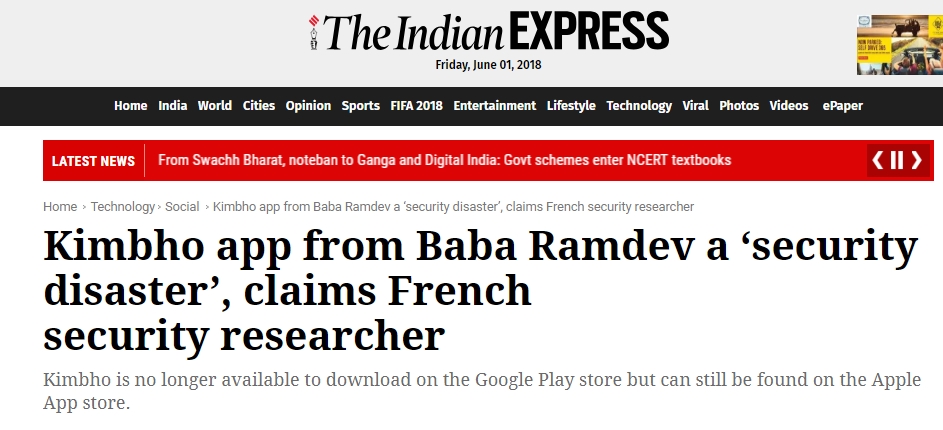
India Today
The news organisation published an article on the evening of May 31, a few hours after the Alt News expose. The headline of the article read, “Ramdev’s Kimbho is mysteriously gone but here are 10 points you should know in case it is back.” The article in true promotional style then goes on to list the various features and benefits of the app. However, another article published on June 1 did flag security concerns regarding the app. An article published by sister publication Business Today also referred to Kimbho’s similarities to the Bolo messenger app.
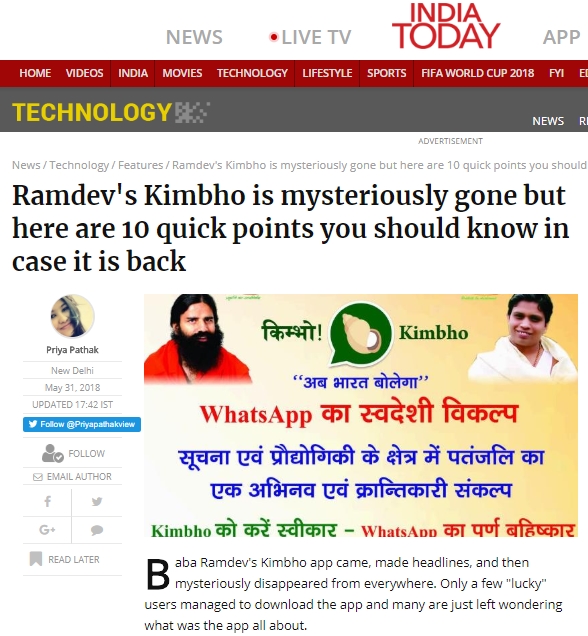
Republic TV
Republic TV broadcast a report on the withdrawal of the app, saying that it was pulled down as it was found to be not secure. It also published an article in which it was reported that Kimbho is based on an app named ‘Bolo’.
Money Control
Money Control is owned by the Network 18 group in which Reliance Industries Ltd has a majority stake. In an article published on June 1, the publication reported about the app’s disappearance from the android store hours after its launch due to security loopholes. The fact that the app has been exposed as having been developed in California, USA found only a cursory one-line mention in the article which stated, “The screenshots for this #swadeshi app have AT&T as the carrier with Fremont, California as the location.”
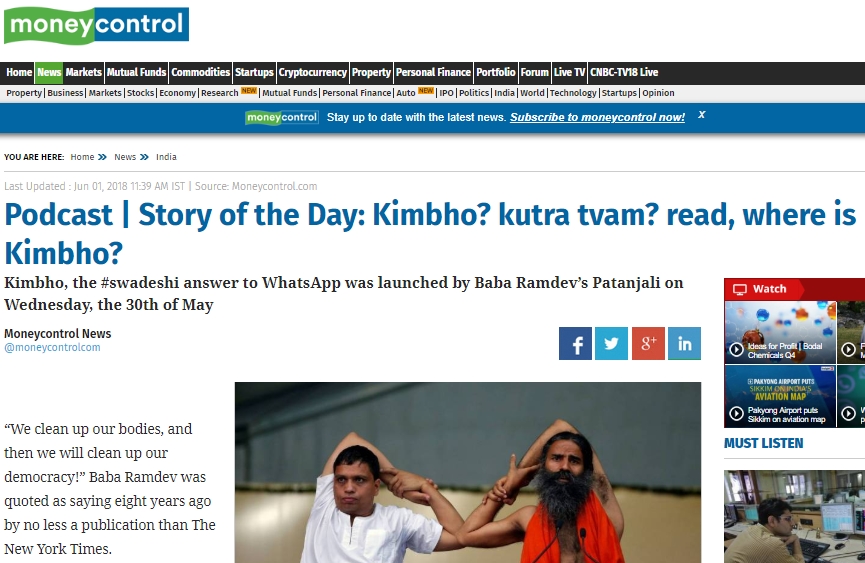
NDTV
NDTV reported about the withdrawal of Kimbho app from the Google store. In its article, it cited the concerns raised by users over the security standard of the app, and also referred to the fact that it has been pointed out that Kimbho is essentially a rebranded version of ‘Bolo’.

Hindi media
Aaj Tak
Hindi news channel Aaj Tak which is owned by the India Today group broadcast a report on the app, in which it was mentioned that the app has serious security issues. The report also alluded to the fact that Kimbho is a rebranded version of Bolo messenger, but did not dig deeper into the issue.
Observations
Alt News observed that in all the news stories cited in this article, the headline or the title of the stories reported about the disappearance of the app. The content of the reports however did not flesh out the details and most ignored the inconvenient details. In fact, a number of articles seemed to promote the application. While the stories stressed on the security aspects of the application, there was reticence over Patanjali’s brazenly misleading marketing strategy of the app which despite being made by a company registered in the USA masqueraded itself as a ‘swadeshi’ app.
Patanjali among the biggest advertisers
Patanjali Ayurved Ltd has consistently ranked among the top companies in terms of advertising in print and television. Broadcast Audience Research Council (BARC) India which is a TV viewership measurement agency releases a ‘Top 10 Advertisers’ list’ every week. According to BARC India data, Patanjali was among the biggest advertisers in terms of ad insertions till 25 weeks in 2017. Patanjali had also ramped up its television advertising in the first 23 weeks of 2017, up by 34% compared to the previous year. However, the numbers for 2018 so far have been sober in comparison with indications that the firm is cutting back on spending on TV advertisements.
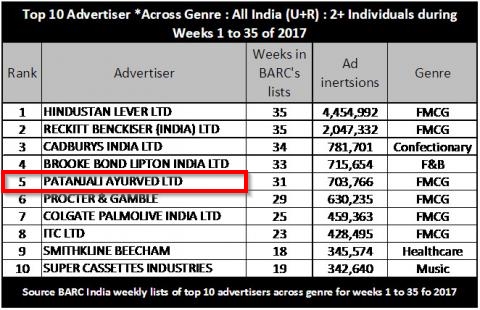
An Economic Times report had stated that according to a court ruling, Patanjali had spent a whopping Rs.570 crore on advertisements in FY 2017.
Does Patanjali being one of the largest advertisers have anything to do with the largely subdued coverage vis-a-vis their latest misadventure?
Independent journalism that speaks truth to power and is free of corporate and political control is possible only when people start contributing towards the same. Please consider donating towards this endeavour to fight fake news and misinformation.




